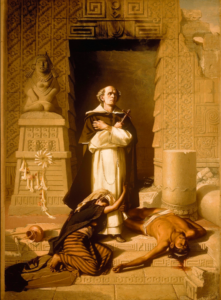Or:
How the Woke monster originated
The fall of Mexico to Christian arms had been followed by the subjugation of other fantastical lands: of Peru, of Brazil, and of islands named—in honour of Philip II—the Philippines. That God had ordained these conquests, and that Christians had not merely a right but a duty to prosecute them, remained, for many, a devout conviction. Idolatry, human sacrifice and all the other foul excrescences of paganism were still widely cited as justifications for Spain’s globe-spanning empire. The venerable doctrine of Aristotle—that it was to the benefit of barbarians to be ruled by ‘civilised and virtuous princes’—continued to be affirmed by theologians in Christian robes.
There was, though, an alternative way of interpreting Aristotle. In 1550, in a debate held in the Spanish city of Valladolid on whether or not the Indians were entitled to self-government, the aged Bartolomé de las Casas had more than held his own. Who were the true barbarians, he had demanded: the Indians, a people ‘gentle, patient and humble’, or the Spanish conquerors, whose lust for gold and silver was no less ravening than their cruelty? Pagan or not, every human being had been made equally by God and endowed by him with the same spark of reason. To argue, as las Casas’ opponent had done, that the Indians were as inferior to the Spaniards as monkeys were to men was a blasphemy, plain and simple. [bold added by Ed.]
‘All the peoples of the world are humans, and there is only one definition of all humans and of each one, that is that they are rational.’ Every mortal—Christian or not—had rights that derived from God. Derechos humanos, las Casas had termed them: ‘human rights’. [bold added by Ed.] It was difficult for any Christians who accepted such a concept to believe themselves superior to pagans simply by virtue of being Christian. The vastness of the world, not to mention the seemingly infinite nature of the peoples who inhabited it, served missionaries both as an incentive and as an admonition. [pages 346-347]
Bartolomé de las Casas was my father’s idol in the last decades of his life, to the extent that he composed La Santa Furia, a symphonic work accompanied by more than a hundred voices and a theatrical performance, which was premiered five years ago (watch it on YouTube here). After the premiere, I wrote a harsh critique of my father’s last symphonic work, which reflects the core of my thinking (an even harsher critique can be found on pages 376-388 of El Grial).
My father died before the premiere of his magnum opus. Among his descendants there is still a son and one of his grandsons who, because of La Santa Furia, believe in the myth of Bartolomé de las Casas: one of the founders of the black legend against Spain.
Guilt. Guilt. Guilt. See Félix Parra Hernández’s (1845–1919) painting above. That is the malware that Christian ethics installed in the white man’s soul (e.g., there are European Dominicans lobbying the Vatican to canonise Las Casas).
